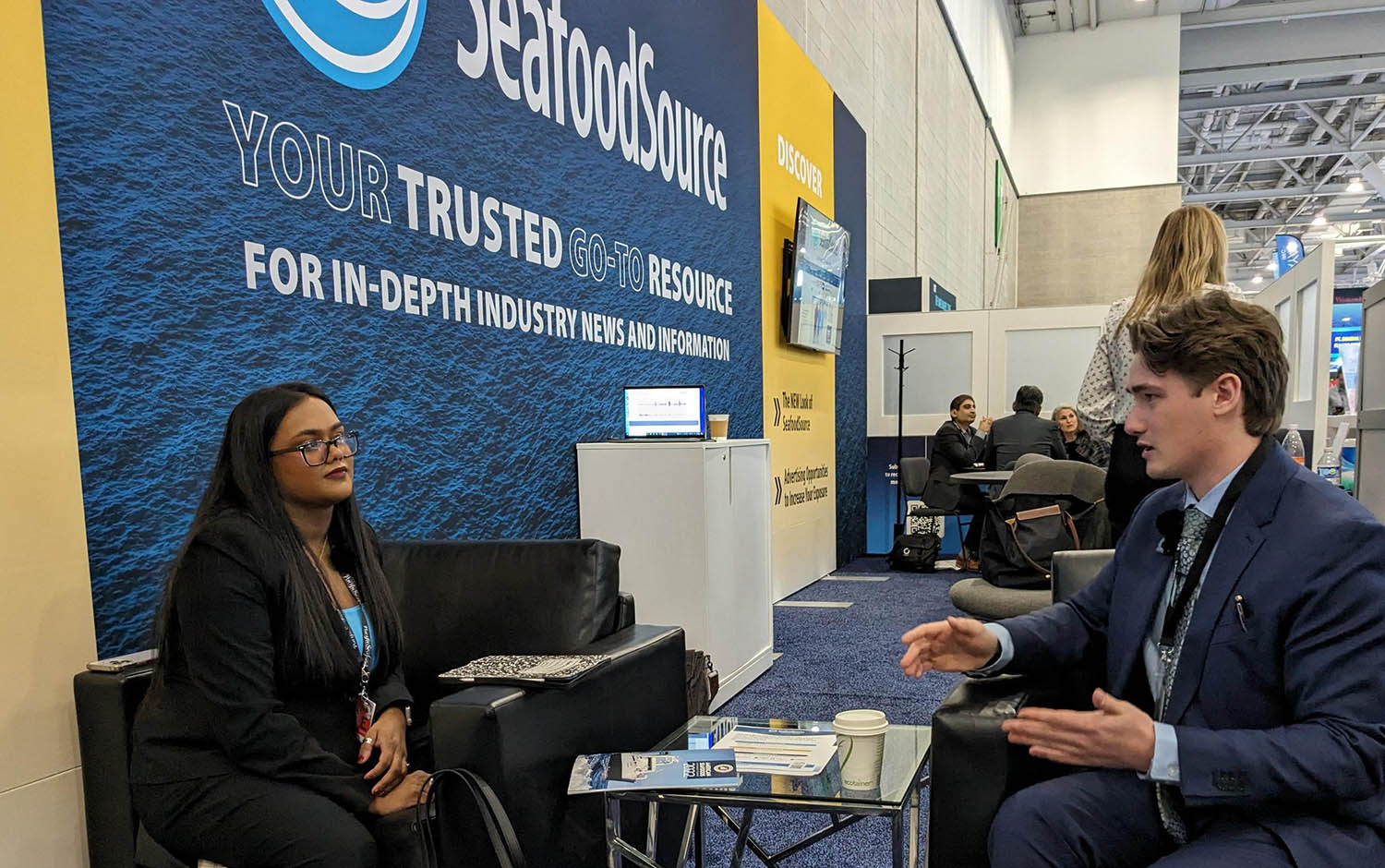James Sibley promotes seafood education, aquaculture, sustainable farming, healthy oceans, and travel through his media company Sibley Media. Now working full time for Mowi, Sibley travels the world to present at seminars, conferences, and forums advocating for aquaculture, as well as advocating as a voice within the social media landscape for the seafood industry as a whole.
In an interview with SeafoodSource at the 2024 Seafood Expo North America, Sibley called for the seafood industry to rethink its social media approach.
SeafoodSource: What is your background in the seafood industry?
Sibley: I started working in seafood during college, kind of like a part-time job around my school courses. I immediately fell in love with it, as do most of us in the seafood world. A bunch of stuff came together, and all of a sudden, [I was] just invested in this industry beyond any chance to ever get out.
In my first post, I was working as a fishmonger, and I kept getting these questions from the stands, like, "What kind of salmon is that? Why are these different colors? Why are those oysters like that?"
From there, I got more and more intricate, and my knowledge base grew. That's when I decided to dive into aquaculture because there's so much hate with aquaculture online, and it's reflected in the stores; wild-caught goes for two, three, or four times as much. It has nothing to do with the quality and has everything to do with the marketing machine behind it.
SeafoodSource: Did you study aquaculture in school?
Sibley: Not until my last year did I focus in on aquaculture with my studies. Up until that point, it was human genetics.
SeafoodSource: Where did that lead you?
Sibley: I graduated in August 2023, and I had a large social media following at that point.
SeafoodSource: What do you do with Mowi?
Sibley: I'm in Raw Materials and Trade at Mowi USA, in its RMT division. We don't make any salmon here, but we sell a lot. So, how does that happen? It's the logistics behind making everything come together, and learning those kinds of nuances to this industry is really important for me, coming into this industry trying to make an impact.
SeafoodSource: What was the response from the seafood industry when you began to gain popularity on TikTok and Instagram?
Sibley: At first, there was a lot of skepticism, but my peers and people who like seafood enjoyed what I was doing, and it was becoming a big thing. I was the first one to do this on TikTok. So, my channel took off at the right time, right place, and as the right voice. There's luck in there, too. Once I had a decently large following and some of the industry started to take notice, they were asking if they could send me fish and whether I could make a video at home with the recipes.
At first, I declined because what I was doing was more education-based, and I didn't want to move away from being an educator and fall into that influencer trap; that was just not me. I waited until I had an opportunity to work with a company not to promote their fish or their products but to showcase their operations.
Once I did that with Mowi, the doors opened. Since then, I've just been working with interesting and forward-thinking aquaculture companies that reach out, ranging from mussel farms to biofloc shrimp to other conferences. I just got back from Saudi Arabia. That was fascinating; they have got a really interesting RAS scene coming out there.
SeafoodSource: Do you think the seafood industry can educate consumers better using social media?
Sibley: What I like to say is, whatever we're doing right now, as an industry, it's not working. Farmers keep getting closed down, the prices keep dropping, and there's more and more push from the public for transparency. Bringing that to them is the problem. People are flooded with misinformation. If you look up the color of farmed salmon on your phone, Google will tell you that it's gray. The problem is endemic to the entire seafood consumer base, and we have to start with them if we want to push back on this. That's something that the seafood industry has been taking better note of. But, there's a long way to go.
SeafoodSource: What is Sibley Media?
Sibley: Besides what I do on TikTok, I also write articles, and I'll help out with consulting companies if they want to improve their digital strategies. I found myself building on media kits for roughly six different things. I realized the work I was doing was a company. So, I put it all under the guise of Sibley Media, and I formed an LLC. I showcase what I provide, such as digital strategies and consulting, in addition to my written, digital, and video content.
SeafoodSource: You have said that there are a lot of misconceptions about aquaculture on social media. In general, what do you think the biggest one is?
Sibley: It's a subjective answer, but one of the biggest things I face is people asking about whether something is safe. I don't get that as much with wild-caught because I still cover some wild fisheries and seafood from there. But, when it's farmed fish, people ask, "Is this safe to eat regularly? Can I feed this to my kids?" Practically no one's asking these kinds of questions about other farmed foods, produce, other meats, poultry, or anything like that. It's all directed at aquaculture, and that's something that is harmful.
People think it's unregulated and involves just dumping stuff in the water. It's the opposite. I could never start my farm. There are so many regulatory walls there. Props to those who do because they're maintaining incredibly high standards.








